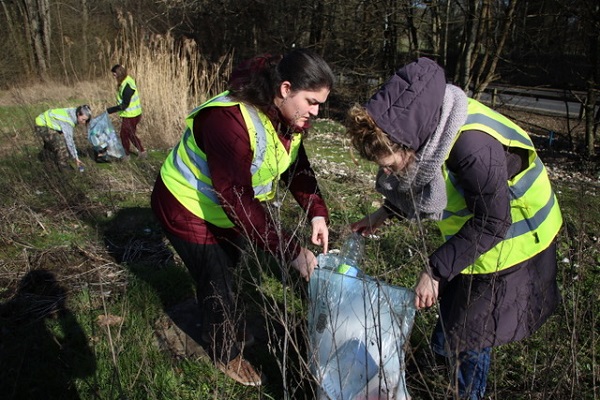
Natur&ëmwelt has announced that its annual "Grouss Botz" (Great Clearing Up) campaign, the first of which was held more than 50 years ago in 1970, will take place across the Grand Duchy in March / April, with specific initiatives orgaised locally by municipalities.
Every spring, the nature conservation organisation invites all municipalities in the country to organise a cleaning campaign in the area together with clubs and private individuals; the "Grouss Botz" has become an established part of local event calendars.
In 1970, the campaign was launched in the European Year for Nature Conservation as part of the first "camp nature" in Müllerthal. With the help of various administrations, nature conservation organisations and forestry students from the army, 200 young people cleaned the forests along the hiking trails in Müllerthal. Since then, spring cleaning has become increasingly popular and around half of all Luxembourg municipalities now take part in the "Grouss Botz" campaign every year.
The "Grouss Botz" serves to raise public awareness and takes place in March / early April. By then the snow has normally disappeared, while hedges and bushes have hardly any leaves, so that the rubbish is clearly visible. In addition, this is before the breeding season for most birds, so the negative impact on nature is kept as low as possible. In general, one should refrain from cleaning in the wild between mid-April and the end of August, so as not to disturb animals too much. However, if one goes for a walk, one can of course always collect the rubbish one finds along the way.
Disposing of rubbish in nature: littering of public spaces
According to the latest study (2015) by the environmental administration, it is said that every year in Luxembourg 1,001 tons of waste are thrown away in nature or disposed of illegally. That is an average of 1.6 kg per inhabitant, 216 kg per kilometre on motorways and 103 kg per kilometre on country roads. The disposal of this waste costs the country €1.2 million per year (90% personnel costs, 4.8% collection and transport costs and 5.2% disposal costs).
According to the organisation Pickitup Asbl, by far the largest portion is plastic waste. This not only looks very ugly, the waste also has serious consequences. Animals can swallow it and die from it in agony.
Throwing away or leaving rubbish (cigarette butts, chewing gum, empty packaging...) in nature is illegal and may result in a fine, e.g. €49 for a cigarette butt thrown on the pavement or €250 for disposing of rubbish in a watercourse.
In cooperation with the University of Luxembourg, water samples are also taken at some "Grouss Botz" campaigns, which then flow into the international FreshWaterWatch study of the Earthwatch Institute.
One can find out from one's municipality when the local “Grouss Botz” campaign is being organised and join the movement. The respective organisers provide the material (garbage bags, gloves, tongs) and later also take care of the disposal of the bags. Make sure you wear gloves and never put yourself in danger, for example near water or along national roads.








